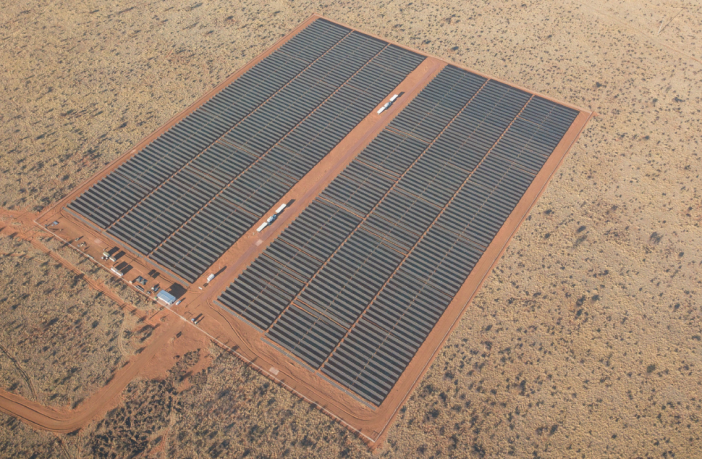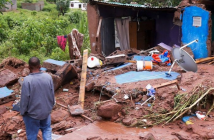Open-Ed
- The formulation of the country’s Integrated Resource Plan (IRP) plus new generation energy procurement falls under the responsibility of the Department of Mineral Resources and Energy, headed up by Minister Gwede Mantashe.
- The delays in both plus the relaxing of generation license rules for private producers has seen competition mount considerably for grid feed in capacity between private and public off-taker projects which washed out in court in September this year. Read more
- A lever govt has left is adjudication on grid feed-in applications which the state owned energy utility, Eskom, manages.
- A second possible lever was introduced the environment minister this week requiring a consent letter from Eskom confirming that the plant design for a wind or solar project does not obstruct access to transmission or distribution infrastructure. Read more
- Eskom may be ‘obstructing’ by denying or delaying private off-takers project grid access applications to secure capacity for public sector energy procurement.
On 16 May this year, Mantashe told Parliament that government will open a bid in July to procure additional renewable energy. Mantashe, who was delivering his Budget Vote speech for the 2023/24 financial year, said Bid Windows 7 and 8 will each give 5 000MW of renewable energy. Read more
Since his appointment is 2019, Mantashe has introduced three large procurement programmes aimed at adding in excess of 8000MW of new generation capacity to the country’s’ grid but only 150MW (hybrid) has flowed into the grid from these programmes to date. Read more
South Africa is in a massive energy crisis and is in desperate need of new generation capacity. South Africans face up to 16 hours of blackouts daily this winter. Read more
South Africa’s Renewable Energy Independent Power Producer Procurement Programme (REIPPPP) has come under a lot of pressure as competition mounts for grid feed in capacity between private and public off-taker projects. Since June 2021, the country has seen a massive uptake in private off-taker projects because the country’s President, Cyril Ramaphosa, waived the generation license requirements for private projects up to 100MW and allowed for wheeling and banking. Read more
Eskom, the South African Wind Energy Association (SAWEA) and South African Photovoltaic Industry Association SAPVIA have collectively conducted a ‘Renewable Energy Grid Survey’. The survey is a first of its kind and provides clear market intelligence on the status of the renewable energy sector in South Africa. The survey reveals that 66GW of renewable energy projects (mostly private off-taker) are under development which includes 21GW of wind and 7.5GW of wind and battery storage plus 13305MW solar PV and 19572MW of solar PV with battery storage. All projects recorded in the survey are ‘shovel ready’ (construction ready) or close to it. Read more
REIPPPP in decline
Only 56 bids were received for the country’s REIPPP Bid Window 6. This marks a dramatic decline in bids by around half compared to Bid Window 5 which was massively oversubscribed, attracting a total of 102 bids. Only five Preferred Bidders with projects totalling 860MW were appointed under the 6th Bid Window of the REIPPPP.
No wind projects awarded in REIPPPP Bid Window 6. The Department received Onshore Wind bid responses amounting to 4116 MW for the Bid Window 6, all of which are located in the Eastern Cape and Western Cape supply areas. Following the confirmation from Eskom during the evaluation that no grid capacity was available to connect any proposed Onshore Wind projects in these supply areas, the Department could unfortunately not award any of the wind projects up to the allocated 3200 MW under the bid window.
Since then, Mantashe appears to be adding preferred bidders piecemeal without any public announcements. Read more
REIPPPP Bid Window 7
Last week during the signing ceremony of four preferred bidders under the first bid window of the Battery Energy Storage Independent Power Procurement (BESIPPP) Programme, which was gazetted in 2019, Mantashe said that REIPPPP BW 7 would be launched within two weeks along with and inaugural gas-to-power bidding round and a second battery storage bid window.
Grid capacity availability
In October Eskom published its latest Generation Connection Capacity Assessment (GCCA 2025), indicating there to be 19.9 GW of grid-connection capacity available nationally. The GCCA 2025 results show that the generation connection capacity in the Northern Cape, Western Cape, Eastern Cape, and Hydra Central supply areas has been depleted. Supply areas with remaining capacity totalling 19.94 GW are:
- KwaZulu-Natal (5 500 MW);
- Gauteng (4 680 MW);
- Limpopo (3 360 MW);
- Mpumalanga (3 320 MW);
- North West (1 660 MW); and
- the Free State (1 420 MW).
To overcome the feed in capacity constraints in the Eastern and Western Cape provinces, Eskom announced that a curtailment addendum to the GCCA would be published that could unlock 4 GW of connection capacity. Last week Eskom’s head of Transmission, Segomoco Scheppers confirmed that the curtailment framework and GGCP were currently before NERSA, the country’s energy regulator. If this is the case, then NERSA will have to embark on a public participation programme for comment and approval. This could take six months or more.
In early November, Eskom provided an update on the grid capacity allocation rules for private off-taker projects. Eskom confirmed that all pending budget quote (BQ) processes in the three Cape provinces have been attended to – of 42 projects totalling 5.1GW, 32 were found to be IGCAR compliant, with 27 collectively allocated 3.2 GW of grid capacity.
The remaining IGCAR compliant projects in the Cape provinces will be issued with cost estimate letters or otherwise allocated grid capacity as and when it becomes available. The relevant Eskom Grid Access Units have since turned to assess pending BQ applications made in the remaining areas falling outside the Cape provinces. Thus far, only 8 of the 44 projects have been found to be IGCAR compliant, with additional information requested from the remainder of the projects. Read more
The latest GGCP attempts to regulate the imbalance by implementing alternating cycles of procurement by providing grid capacity allocation between public and private off-taker projects, with grid cost estimate letters issued by Eskom, to each specific programme.
This is one of the few levers government currently has to slow private off-taker projects and it would explain unofficial reports that of late, where grid cost estimate letter applications made by IPP’s with private off-taker projects in geographical locations where grid feed in capacity exists, have been declined or the outcome is under extended delay.
The current ‘obstruction’ may be extended because of the delay in the IRP adoption
Last week Mantashe confirmed that the draft IRP was submitted to Cabinet on November 29 but they requested more deliberation time before approving the document for public consultation.
With the grid capacity constraints in mind, the IRP outlines the new energy generation mix of technologies and associated capacities to be rolled out typically on a 10-year horizon. Mantashe revealed that the new IRP document would be broken into two phases. The first phase will specify generation technology and capacity allocation leading up to 2030 and the second phase covering the period beyond 2030.
Once passed Cabinet the draft IRP it will then go to the executive for approval. Thereafter it will go through a public consultation process. Mantashe said that the IRP ‘should’ be finalised this year but judging from the controversial delays and hot contestation expected in passing the Electricity Regulation Act Amendment Bill, which like the IRP is central to the joint efforts of business and government to solve the electricity crisis, the IRP may not be adopted before next year’s election. If the IRP is not passed before the national elections, the process will then have to start from scratch.
Author: Bryan Groenendaal
Disclaimer: The articles and videos expressed in this publication are those of the authors. They do not purport to reflect the opinions or views of Green Building Africa, our staff or our advertisers. The designations employed in this publication and the presentation of material therein do not imply the expression of any opinion whatsoever on the part Green Building Africa concerning the legal status of any country, area or territory or of its authorities.
















1 Comment
Wow, quite an extensive, comprehensive article, with some new facts for me. One strongly gets the impression that Min GM just does what he likes, with all kind of behind the screen deals.
Not surprising.